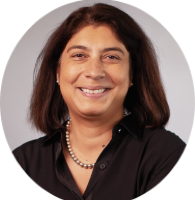Reshma Kewalramani
Reshma Kewalramani became the first female CEO of a large US biotech company as president and CEO of Vertex Pharmaceuticals on April 1, 2020. She was born in Mumbai and came to the United States at age 11. Her success story exemplifies American greatness. Vertex has continued to develop and receive regulatory approvals for groundbreaking therapies, including treatments for cystic fibrosis under her leadership.
Reshma Kewalramani has led Vertex Pharmaceuticals to become a biotech powerhouse valued at $110 billion. She secured regulatory approval for CASGEVY, the world’s first approved therapy using Nobel Prize-winning CRISPR gene-editing technology to treat sickle cell disease and beta thalassaemia.
CEO’s | Actors | Politicians | Sports Stars
The FDA approved Journavx, the company’s revolutionary non-opioid painkiller in January 2025—marking the first new type of pain medicine approved in decades. These achievements earned Kewalramani the 62nd position on Fortune’s 2025 list of the 100 Most Powerful People in Business. She stands as the only Indian-origin woman CEO of a major US biotechnology company on this year’s prestigious list.

Early Life and Education
Born in Bombay and immigrated to the US at age 11
Reshma Kewalramani’s story began in Bombay, India, where she was born in 1973. Her life changed dramatically when she immigrated with her family to the United States in 1988 and settled in Long Island at age 11. The family made their home in a modest one-bedroom apartment, where academic excellence served as the family currency. She faced the challenge of adapting to a new country as a pre-teen but managed to keep her ambitions and devoted herself to academics with determination.
Family values played a significant role in shaping Kewalramani’s career path. She once said with humour, “In my family the career choices were basically engineering, medicine, or priesthood—I chose medicine”. This reflexion shows how cultural expectations and family influence directed her educational path, while her personal passion drove the final decision.
Academic excellence at Boston University
Educational achievements defined Kewalramani’s early career development. She joined an accelerated programme at Boston University to earn both her bachelor’s and medical degrees in seven years. Her academic excellence shone throughout her university years. She graduated from Boston University’s seven-year liberal arts/medical education programme in 1998 with the highest honours: Phi Beta Kappa and Summa Cum Laude.
Boston University’s supportive environment shaped Kewalramani’s development as a future leader. She reflected on her time there: “I [gained confidence] at BU because it was a nurturing environment. It was a challenging environment. It was a place where you could make a real difference and people gave you the chance to do so”. This period built her foundational knowledge and helped foster the leadership qualities that would benefit her later.
Advanced training in nephrology and internal medicine
Medical specialisation followed her outstanding undergraduate performance. She completed her internship and residency in internal medicine at Massachusetts General Hospital (MGH). Her specialised medical training continued through a fellowship in nephrology at the combined programme of Massachusetts General Hospital and Brigham and Women’s Hospital, two of Harvard Medical School’s main teaching hospitals.
Her research work enhanced her clinical practise. After completing her fellowship in clinical nephrology, she focused on transplantation research. During this time, she developed an ambitious professional goal—to become what she called a “triple threat” in academic medicine: someone skilled in research, teaching future doctors, and delivering excellent patient care. This all-encompassing approach to medicine would eventually lead her to create broader healthcare impact.
Harvard Business School management programme
Leadership development emerged as the next natural step in Kewalramani’s educational path. She recognised management skills would complement her medical expertise and expanded her qualifications at Harvard Business School. Her successful completion of the General Management Programme at Harvard Business School in 2015 prepared her for future leadership roles.
The combination of medicine and business education proved vital to Kewalramani’s career progression. Harvard’s programme gave her the business knowledge needed to direct the complex biotech industry, adding to her extensive medical expertise. This unique blend of medical and business management knowledge set the stage for her rise through the corporate ranks of the biotechnology sector.
Medical Career Before Biotech
Practising physician at top Boston hospitals
Professional beginnings at prestigious institutions shaped Reshma Kewalramani’s early medical career. After completing her training, she became a physician at Massachusetts General Hospital and Brigham and Women’s Hospital—two of Harvard Medical School’s main teaching hospitals. She broadened her clinical expertise by serving as a physician at the Massachusetts Eye and Ear Infirmary and the Massachusetts Institute of Technology, which gave her experience in different specialised settings.
Board certifications showed her dedication to excellence. Kewalramani earned her board certification in Internal Medicine in 2001 and Nephrology in 2003. She also became a Fellow of the American Society of Nephrology, cementing her position among kidney medicine specialists.
Career ambitions shaped her growth during this period. Kewalramani wanted to become what she called a “triple threat” in academic medicine—a physician who excelled at patient care, teaching, and laboratory research. This comprehensive approach guided her early career choices and development path.
Research in transplantation and nephrology
Scientific investigations became central to Kewalramani’s medical career. After her clinical nephrology fellowship, she focused on basic science research in transplantation, specifically co-stimulatory blockade. This research area represented advanced work in understanding immunological responses in organ transplantation, reflecting her passion for expanding medical knowledge.
Clinical studies strengthened her research portfolio. She worked extensively with various disease states, including chronic kidney disease (CKD), anaemia, diabetes, heart failure, and both primary and secondary hyperparathyroidism. Her focus on anaemia and CKD led her to lead important cardiovascular outcomes trials in these areas.
Landmark trials she directed included RED HF (Reduction of Events With Darbepoetin Alfa in Heart Failure Trial), TREAT (Trial of Darbepoetin Alfa in Type 2 Diabetes and Chronic Kidney Disease), and EVOLVE (Evaluation of Cinacalcet Therapy to Lower Cardiovascular Events). These major clinical investigations advanced medical knowledge in nephrology and related fields substantially.
Teaching and clinical mentorship roles
Academic contributions rounded out her medical achievements. While advancing her clinical and research career, Kewalramani taught and mentored the next generation of physicians. Her teaching excellence earned her Harvard Medical School’s Excellence in Teaching Award.
Professional recognition came throughout her medical career. Beyond her teaching award, she received the American College of Physicians Associates Council Award and the American Medical Women’s Association Janet M. Glasgow Memorial Achievement Citation. These honours highlighted her clinical expertise and role as a groundbreaking woman in medicine.
Career reflexion led to a major change. By 2004, despite her successful clinical career, Kewalramani started to think about her path differently. Her medical education had encouraged a deep appreciation for clinical research and she learned about “the importance of new medicines in improving patients’ lives”. This insight, combined with her observation that “the biotech industry was where the big advances in patient care were happening”, made her think about a dramatic career change.
Transition decision became clear when Kewalramani felt her academic lab work had lost its connection to direct patient impact. She saw that her laboratory focused on “fundamental discoveries, regardless of whether they led to new medicines,” which left her feeling “isolated from the patients she was driven to help”. In 2004, she made the bold move to leave her career as a physician and nephrologist to join the biotechnology industry, marking her shift from clinical medicine to pharmaceutical leadership.
Transition to the Biotech Industry
Joining Amgen and early leadership roles
Career pivot became a turning point in Reshma Kewalramani’s professional trip when she left her 2004-old hospital post to join Amgen, one of the world’s largest biotechnology companies. She moved across the country to California with her husband and young twin boys. Her exceptional leadership qualities at Amgen shaped her future path in the pharmaceutical industry.
Leadership growth defined her twelve years at Amgen. She took on roles with increasing responsibility in Clinical Development and Medical Affairs. She served as Vice President and Global Head of the Nephrology and Metabolic Therapeutic Area, which showed her medical expertise in a corporate setting. Kewalramani’s next role as Vice President and Head of Amgen’s US Medical Organisation let her build and grow a division that managed the company’s full portfolio across six therapeutic areas.
Professional development expanded as she gained real-life experience in research and commercialization in a variety of therapeutic areas. She led late-stage clinical trials and worked with regulatory authorities to bring new therapies to patients. These experiences built her reputation as a physician-scientist who knew how to turn scientific discoveries into real treatments for patients.
Motivation to move from clinic to drug development
Crossroads reflexion came in the early 2000s at a crucial point in Kewalramani’s career. She loved one-on-one patient care but saw that the biggest advances in patient treatment came from the biopharmaceutical sector. This made her think about her professional path and look for chances beyond traditional clinical practise.
Influential realisation came when Kewalramani found her main inspiration: “I realised that what inspired me most was seeing the impact of new medicines for patients, and I recognised that the front lines of this work was within the biotech industry. This is why I decided to move from academia to drug development”. This insight sparked her switch from clinical medicine to the biopharmaceutical industry.
Research refocus grew as Kewalramani saw her academic lab work focused on “fundamental discoveries, regardless of whether they led to new medicines,” which left her feeling “isolated from the patients she was driven to help”. Moving to industry would let her help patients while expanding her reach beyond individual clinical visits to potentially help thousands through innovative drug development.
Joining Vertex Pharmaceuticals in 2017
Boston homecoming brought Kewalramani back to her academic roots in Massachusetts in 2017. After twelve successful years at Amgen, she became Vertex Pharmaceuticals’ Vice President of Clinical Development. This move marked both a return home and a strategic career step forward.
Patient-centred alignment drew Kewalramani to Vertex. She said: “Vertex captured my heart and imagination when I saw the opportunity to help create medicines that have a huge impact on people’s lives”. “Vertex’s model of working in serious diseases where we have a deep understanding of causal human biology and validated targets, because it gives us a higher chance of success when making the leap from the lab bench to a patient” especially appealed to her.
Rapid advancement marked her time at Vertex Pharmaceuticals. She joined in February 2017 and became Chief Medical Officer in 2018, proving her exceptional leadership abilities and pharmaceutical expertise. She took charge of clinical development, global regulatory affairs, medical affairs, drug safety, and related areas, becoming a key figure in the company’s leadership team.
Leadership philosophy at Vertex showed Kewalramani’s commitment to patients: “It’s a privilege to work at a company with such a relentless focus on science and deep commitment to improving the lives of patients and their families”. This focus on scientific excellence and patient welfare helped her reach the company’s highest leadership position, making her a transformative figure in the biopharmaceutical industry.
Leadership at Vertex Pharmaceuticals
Becoming Chief Medical Officer in 2018
Reshma Kewalramani’s career at Vertex Pharmaceuticals took off quickly. She joined the company in 2017 and became Chief Medical Officer just a year later. Her role included oversight of clinical development, global regulatory affairs, medical affairs, and drug safety. Her background as a physician gave her unique insights into drug development decisions—a rare quality among biotech executives at her level.
Appointed CEO in 2020 – a historic milestone
Kewalramani made history in April 2020 by becoming president and CEO at Vertex Pharmaceuticals. She broke new ground as the first female CEO of a major public U.S. biotechnology company. Her growing influence reflected in her compensation, which grew from $12.8 million in her first full year to $17.4 million by 2023.
CRISPR-based Casgevy approval for sickle cell
The FDA’s approval of CASGEVY in December 2023 marked a pivotal moment under Kewalramani’s leadership. This therapy became the first CRISPR/Cas9 genome-edited cell treatment approved in the United States. Kewalramani described it as “a momentous breakthrough” that offered “the potential of a one-time transformative therapy” to about 16,000 eligible patients with sickle cell disease.
Journavx: a breakthrough non-opioid painkiller
January 2025 brought another win with FDA approval of JOURNAVX (suzetrigine), the first new pain medicine class in over two decades. Kewalramani noted this as “a historic milestone for the 80 million people in America prescribed medicine for moderate-to-severe acute pain each year”. This medication blocks pain signals before they reach the brain and provides effective relief without addiction risks.
Growth of Vertex to $110 billion valuation
Vertex’s market value soared beyond $110 billion by 2025 under Kewalramani’s leadership. The company doubled both its workforce and medicine portfolio since 2017. Kewalramani’s brief tenure as CEO has earned her recognition for “exemplary leadership” in strategic acquisitions and new drug approvals. She stands among the world’s most influential business leaders today.
Recognition, Boards, and Personal Life
Reshma Kewalramani’s amazing trip from a young immigrant to the first female CEO of a major US biotech company shows what determination and visionary leadership can achieve. Her path from a practising nephrologist to a pharmaceutical pioneer shows how career growth can create bigger effects. At Vertex Pharmaceuticals, she has changed the biotech world through state-of-the-art treatments like CASGEVY and JOURNAVX.
Kewalramani’s story shows the power of combining medical knowledge with business skills. She chose the traditional path of academic medicine at first. But she soon realised biotechnology could help more patients, which led to her career move. This choice has helped countless patients worldwide through breakthrough treatments developed under her watch.
Vertex’s financial growth under Kewalramani’s leadership proves her strong strategic vision. The company’s $110 billion valuation is impressive. Yet her biggest achievement lies in creating life-changing treatments for conditions that needed attention. Her work has improved human health and quality of life way beyond business success.
Kewalramani’s rise from Mumbai to Massachusetts is a true American success story. She brings something special by connecting scientific breakthroughs with patient care. Her doctor’s background shapes how she approaches drug development. She makes sure patient needs drive Vertex’s mission. As she keeps breaking barriers and developing new therapies, Kewalramani’s legacy as a groundbreaking leader in biotechnology grows stronger each day.
Key Takeaways
Reshma Kewalramani’s extraordinary journey from immigrant physician to biotech CEO offers powerful lessons about career transformation, leadership excellence, and making meaningful impact at scale.
- Career pivots can amplify impact: Kewalramani left successful clinical practise to join biotech, recognising that drug development could help thousands rather than individual patients.
- Medical expertise drives pharmaceutical innovation: Her physician background uniquely positions her to develop patient-centred treatments like CASGEVY and JOURNAVX that address real clinical needs.
- Breaking barriers creates lasting change: As the first female CEO of a major US biotech company, she’s opened doors whilst building Vertex into a $110 billion powerhouse.
- Strategic vision delivers breakthrough results: Under her leadership, Vertex achieved historic FDA approvals for the first CRISPR gene therapy and first new pain medicine class in decades.
- Combining clinical knowledge with business acumen: Her Harvard Business School training complemented her medical expertise, enabling her to excel in pharmaceutical leadership roles.
Kewalramani’s success demonstrates that the most transformative leaders often emerge from unexpected career transitions, bringing fresh perspectives that revolutionise entire industries whilst maintaining unwavering focus on improving human lives.
FAQ:
What is known about Reshma Kewalramani’s family?
She immigrated from Mumbai to the U.S. with her family when she was 11. She currently lives in Massachusetts with her twin sons.
What is Reshma Kewalramani’s salary (or total compensation)?
In 2023, her total compensation as CEO of Vertex Pharmaceuticals was about USD 20.6 million.
What is Reshma Kewalramani’s age / date of birth?
She was born in 1973, making her about 51 or 52 years old.
What is her connection to Amgen?
She worked at Amgen for 12 years in leadership roles within research, clinical development, and medical affairs before joining Vertex.
Is Reshma Kewalramani Indian?
Yes. She was born in Mumbai, India and is Indian-origin. She moved to the U.S. as a child but retains ties to India.




